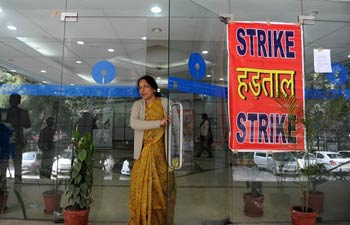
Mumbai, August 21: All business and commercial activities across the country are likely to be crippled as the entire banking industry employees would go on a two-day strike starting Wednesday, a banking union official said here Monday.
Over a million employees and officers of 27 public sector banks, 12 old generation private banks and eight foreign banks will take part in the strike, said All India Bank Employees Association secretary Vishwas Utagi.
Among other things, they will protest the government's move to amend the banking laws bill, presently pending before parliament and scheduled for discussions Aug 23 and 24, Utagi said in a statement here.
"The proposed banking law amendments proposing to adversely amend the Banking Regulation Act, 1949, and Banking Companies' Acquisition & Transfer of Undertakings Act, aimed at merger of banks, allowing private and foreign capital in banks, unrestricted voting rights and granting licences to corporate business houses to start new banks, are aimed at handing over the Indian private sector banking to multi-national banks and increasing the presence of Indian corporate and foreign direct investment in public sector banks," Utagi said.
The outcome of these proposed measures would be closure of rural bank branches, resorting to a large number of ultra-small branches, thereby privatising rural banking operations through contractual businesses, he claimed.
The strike would also oppose outsourcing of work to outside agencies, and other "anti-labour" policies, jeopardising jobs in the banking sector and aimed at undermining the collective bargaining strength.
During the strike, bank employees here will take out a procession to Azad Maidan in support of their demands, he added.





Comments
Add new comment